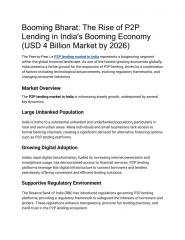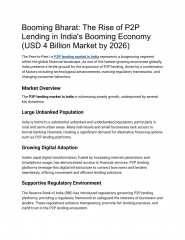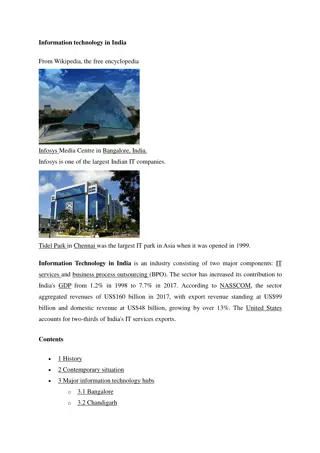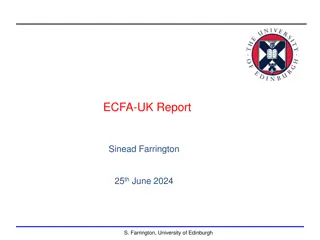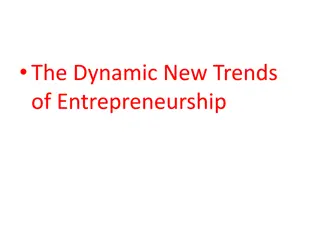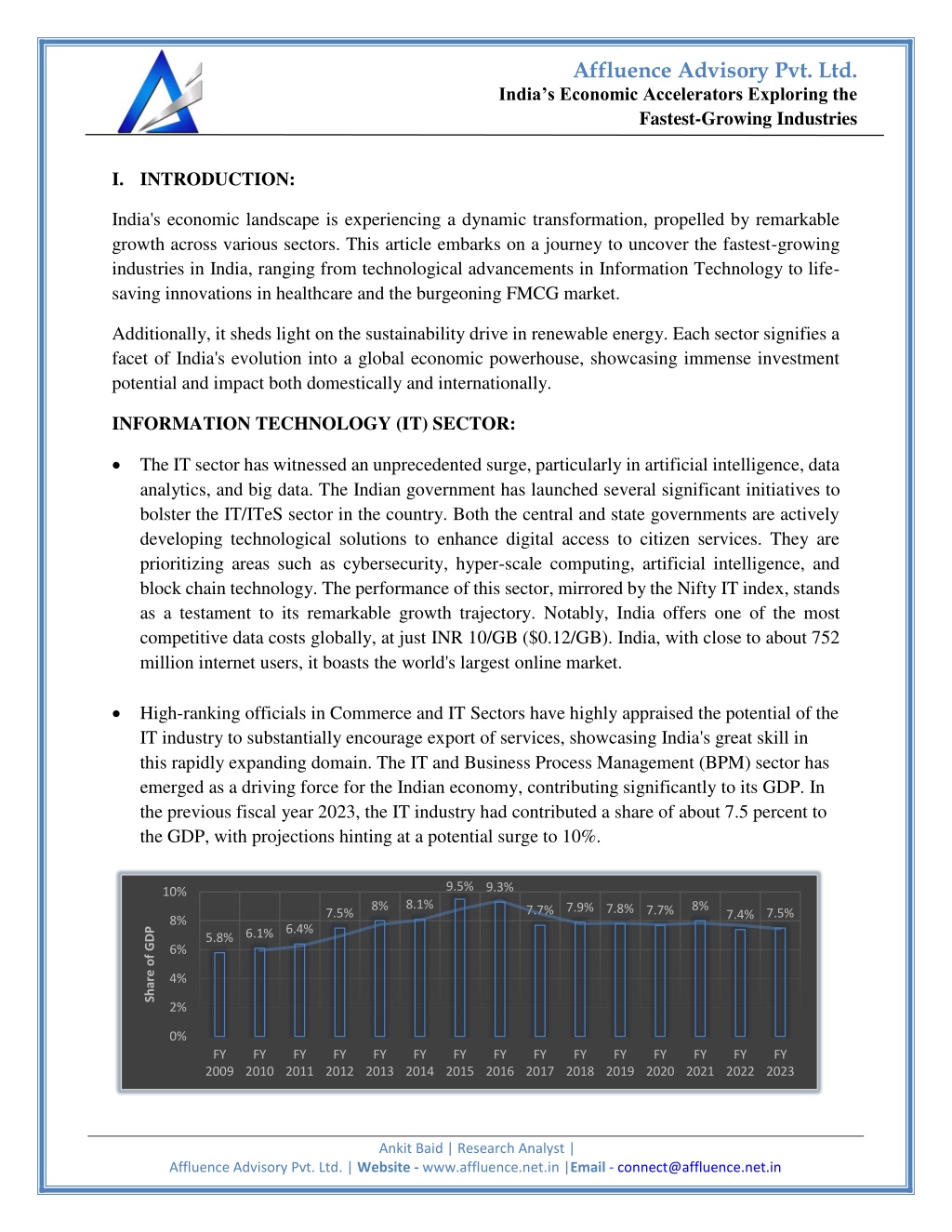
India’s Economic Accelerators Exploring the Fastest-Growing Industry
India's economic landscape is rapidly transforming, driven by growth in key sectors such as Information Technology, Fintech, and Renewable Energy. This article explores these industries' advancements, highlighting their role in shaping India's evolution into a global economic powerhouse.
- #IndiaGrowth
- #EconomicTransformation
- #IT
- #Fintech
- #RenewableEnergy
- #DigitalEconomy
- #TechInnovation
- #SustainableEnergy
- #InvestmentOpportunities
- #GlobalPowerhouse
Download Presentation

Please find below an Image/Link to download the presentation.
The content on the website is provided AS IS for your information and personal use only. It may not be sold, licensed, or shared on other websites without obtaining consent from the author. Download presentation by click this link. If you encounter any issues during the download, it is possible that the publisher has removed the file from their server.
E N D
Presentation Transcript
Affluence Advisory Pvt. Ltd. India s Economic Accelerators Exploring the Fastest-Growing Industries I.INTRODUCTION: India's economic landscape is experiencing a dynamic transformation, propelled by remarkable growth across various sectors. This article embarks on a journey to uncover the fastest-growing industries in India, ranging from technological advancements in Information Technology to life- saving innovations in healthcare and the burgeoning FMCG market. Additionally, it sheds light on the sustainability drive in renewable energy. Each sector signifies a facet of India's evolution into a global economic powerhouse, showcasing immense investment potential and impact both domestically and internationally. INFORMATION TECHNOLOGY (IT) SECTOR: The IT sector has witnessed an unprecedented surge, particularly in artificial intelligence, data analytics, and big data. The Indian government has launched several significant initiatives to bolster the IT/ITeS sector in the country. Both the central and state governments are actively developing technological solutions to enhance digital access to citizen services. They are prioritizing areas such as cybersecurity, hyper-scale computing, artificial intelligence, and block chain technology. The performance of this sector, mirrored by the Nifty IT index, stands as a testament to its remarkable growth trajectory. Notably, India offers one of the most competitive data costs globally, at just INR 10/GB ($0.12/GB). India, with close to about 752 million internet users, it boasts the world's largest online market. High-ranking officials in Commerce and IT Sectors have highly appraised the potential of the IT industry to substantially encourage export of services, showcasing India's great skill in this rapidly expanding domain. The IT and Business Process Management (BPM) sector has emerged as a driving force for the Indian economy, contributing significantly to its GDP. In the previous fiscal year 2023, the IT industry had contributed a share of about 7.5 percent to the GDP, with projections hinting at a potential surge to 10%. 9.5% 9.3% 10% 8.1% 8% 8% 7.9% 7.8% 7.7% 7.7% 7.5% 7.4% 7.5% 8% 6.4% Share of GDP 6.1% 5.8% 6% 4% 2% 0% FY FY FY FY FY FY FY FY FY FY FY FY FY FY FY 2009 2010 2011 2012 2013 2014 2015 2016 2017 2018 2019 2020 2021 2022 2023 Ankit Baid | Research Analyst | Affluence Advisory Pvt. Ltd. | Website - www.affluence.net.in |Email - connect@affluence.net.in
Affluence Advisory Pvt. Ltd. India s Economic Accelerators Exploring the Fastest-Growing Industries The burgeoning demand for software development, IT consulting, and outsourcing has propelled this growth. Small IT startups are carving their niche markets through innovative use of cutting-edge technologies. With increasing digitization across all sectors of the Indian economy, IT and software services are poised to become immensely profitable businesses. India is among the top ten countries in the world for the use of industrial robots, demonstrating its early success in the field of robotics. The new policy aims to expand on this by making India a center for robot manufacturing and technology, in addition to becoming a major user of robots. FINTECH SECTOR: The Fintech sector has experienced fast growth, fueled by the imperative for digital financial solutions. Through relentless innovation, Fintech is establishing itself as a cornerstone of the Indian economic landscape, reflecting the sector's rapid evolution and its pivotal role in the digital economy. Indian Fintech companies have prioritized user experience, ensuring seamless functionality, thereby becoming the catalysts for this accelerated growth. The pandemic-induced shift towards cashless transactions further propelled the adoption of digital payments, especially during the period of Demonetization. The National Payments Corporation of India (NPCI), in collaboration with the Reserve Bank of India and the Indian Banks' Association, laid the groundwork for several payment systems. Leveraging the Unified Payment Interface (UPI), Indian Fintech companies have witnessed exponential growth in recent years, with payment systems emerging as flag bearers of the Indian Fintech space. 65 60.1 60 Financial inclusion index 56.4 53.9 53.1 55 49.9 50 46 43.4 45 40 FY 2017 FY 2018 FY 2019 FY 2020 FY 2021 FY 2022 FY 2023 Ankit Baid | Research Analyst | Affluence Advisory Pvt. Ltd. | Website - www.affluence.net.in |Email - connect@affluence.net.in
Affluence Advisory Pvt. Ltd. India s Economic Accelerators Exploring the Fastest-Growing Industries RENEWABLE ENERGY SECTOR: The renewable energy sector has experienced significant growth and innovation in recent years, driven by increasing awareness of climate change, the need to reduce greenhouse gas emissions, and advancements in technology. Renewable energy sources such as solar, wind, hydroelectric, biomass, and geothermal power offer sustainable alternatives to fossil fuels. Solar energy has seen remarkable progress with decreasing costs and improving efficiency of photovoltaic (PV) panels. Wind energy continues to expand, with larger and more efficient turbines being developed to harness wind power more effectively. Hydroelectric power remains a significant contributor to global electricity generation, particularly in regions with abundant water resources. Biomass energy, derived from organic materials such as wood, agricultural residues, and organic waste, is being increasingly utilized for electricity generation and heating. Geothermal energy, extracted from the Earth's heat, is also gaining attention as a reliable and clean energy source. Government policies, incentives, and subsidies play a crucial role in driving investments in renewable energy projects. Many countries have set ambitious targets for increasing the share of renewables in their energy mix to reduce reliance on fossil fuels and mitigate climate change. Challenges remain, including intermittent issues with certain renewable sources like solar and wind, energy storage limitations, and the need for infrastructure upgrades to support widespread adoption. However, ongoing research and development efforts aim to address these challenges and further accelerate the transition to a renewable energy-based economy. India hopes to have 450 Gigawatt (GW) of renewable energy capacity by 2030, which will be made up of 140 GW of wind power, 10 GW of biofuels, 280 GW of solar power, and 5 GW of small hydropower. India has come a long way in achieving this goal, with its renewable energy sector growing rapidly in the last few years. Ankit Baid | Research Analyst | Affluence Advisory Pvt. Ltd. | Website - www.affluence.net.in |Email - connect@affluence.net.in
Affluence Advisory Pvt. Ltd. India s Economic Accelerators Exploring the Fastest-Growing Industries India has been increasingly focusing on electric vehicles (EVs) as part of its efforts to reduce pollution, decrease dependence on imported fossil fuels, and meet its climate commitments. Several initiatives have been undertaken to promote the adoption and manufacturing of electric vehicles in the country. The Faster Adoption and Manufacture of (Hybrid &) Electric Vehicles (FAME) scheme was launched by the Indian government to incentivize the adoption of electric and hybrid vehicles. It offers subsidies and incentives to both buyers and manufacturers of electric vehicles. India is additionally working on developing a robust charging infrastructure to support the widespread adoption of electric vehicles. Public charging stations are being installed in various cities, highways, and public spaces. The Indian government is collaborating with various stakeholders including automakers, technology companies, and international organizations to accelerate the adoption of electric vehicles and develop indigenous technology. Many cities in India are introducing electric buses and taxis to reduce emissions and improve air quality. Several state governments have announced plans to electrify their public transport fleets. The Goods and Services Tax (GST) on electric vehicles has been reduced to promote their affordability and adoption. Ankit Baid | Research Analyst | Affluence Advisory Pvt. Ltd. | Website - www.affluence.net.in |Email - connect@affluence.net.in
Affluence Advisory Pvt. Ltd. India s Economic Accelerators Exploring the Fastest-Growing Industries On February 29, the Union Cabinet approved three new semiconductor units under the "Development of Semiconductors and Display Manufacturing Ecosystems in India"agenda. Semiconductor Fab with 50,000 wfsm capacity at Dholera, Gujarat. Semiconductor ATMP (Assembly, Test, Marking and Packaging) unit at Morigaon, Assam Semiconductor ATMP unit for specialized chips at Sanand, Gujarat The opening of these three facilities will allow India to establish itself as a major global chip manufacturing powerhouse. An estimated 60,000 indirect jobs and 20,000 direct jobs in sophisticated technology might be generated by the three plants. Semiconductor chips, the foundation of modern technology, power everything from cellphones to pricey drones and self-driving cars. Currently, Taiwan, China, the US, South Korea, and Japan have the lion's share of the semiconductor manufacturing industry. As per the finance documents produced by the central government, the revised estimate of expenditure for the Modified Programme for Development of Semiconductors and Display Manufacturing Ecosystem in India in FY24 is INR 150.3 million. As to the findings of a study analysis, the Indian semiconductor industry was valued at US$34.3 billion in 2023 and is anticipated to rise at a compound annual growth rate (CAGR) of 20.1 percent to reach US$100.2 billion by 2032. The use of semiconductors in areas like safety, electrification, networking, and communication is expected to increase as electric vehicles (EVs) gain popularity and production in India. These units have the power to dramatically change the semiconductor industry since they place a high priority on improving job chances and enhancing chip design strengths. CONCLUSION: In conclusion, the IT, Fintech & Renewable sectors stand out as two of the fastest-growing industries in the Indian economy. The IT industry serves as a pioneer, laying the groundwork for innovation and digital adaptation across all sectors. Meanwhile, the Fintech sector drives financial inclusion and efficiency, serving as a backbone for India's transition into a digital economy. Together, these sectors underscore India's dynamic economic trajectory, promising immense opportunities for growth and development on both national and global fronts. Ankit Baid | Research Analyst | Affluence Advisory Pvt. Ltd. | Website - www.affluence.net.in |Email - connect@affluence.net.in
Affluence Advisory Pvt. Ltd. India s Economic Accelerators Exploring the Fastest-Growing Industries Disclaimer:This article provides general information existing at the time of preparation and we take no responsibility to update it with the subsequent changes in the law. The article is intended as a news update and Affluence Advisory neither assumes nor accepts any responsibility for any loss arising to any person acting or refraining from acting as a result of any material contained in this article. It is recommended that professional advice be taken based on specific facts and circumstances. This article does not substitute the need to refer to the original pronouncement Ankit Baid | Research Analyst | Affluence Advisory Pvt. Ltd. | Website - www.affluence.net.in |Email - connect@affluence.net.in

